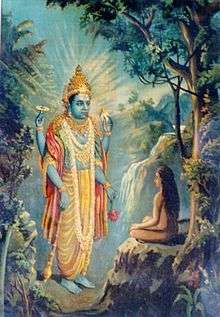Dhruva
| Dhruva | |
|---|---|
|
North Pole Star God of the Stars | |
 | |
| Affiliation | Devotee of Vishnu |
| Parents | Uttānapāda |
Dhruva (ध्रुव "constant, immovable, fixed") is a devotee of Vishnu mentioned in the Vishnu Purana and the Bhagavata Purana.[1][2]
The Sanskrit term dhruva nakshatra "immovable star" is used of the polar star in the Mahabharata, personified as son of Uttanapada and grandson of Manu, even though Polaris at the likely period of the recension of the text of the Mahabharata was still several degrees away from the celestial pole.[3][4]
Narrative
Dhruva was born a son of the King Uttānapāda (the son of Svayambhuva Manu) and his wife Suniti. The king also had another son Uttama,born to his second queen Suruchi, who was the preferred object of his affection. Once, when Dhruva was a child of five years of age, he was sitting on his father's lap at the King's throne. Suruchi, who was jealous of the older son from the first wife (since he - Dhruva - would be heir to throne, and not Suruchi's son), forcefully removed Dhruva from his father's lap. When Dhruva protested and asked if he could not be allowed to sit on his father's lap, Suruchi berated him saying, 'only God can allow you that privilege. Go ask him'.[5]
Suniti - being of gentle nature and now the lesser favorite wife - tried to console the distraught child, but Dhruva was determined to hear of his fate from the Lord himself! Seeing his firm resolve, his mother bade him farewell as he set out on a lonely journey to the forest. Dhruva was determined to seek for himself his rightful place, and noticing this resolve, the divine sage Narada appeared before him and tried to desist him from assuming a severe austerity upon himself at such an early age. But, Dhruva's fierce determination knew no bounds, and the astonished sage guided him towards his goal by teaching him the rituals and mantras to meditate on when seeking lord Vishnu. The one mantra which Narada taught and which was effectively used by Dhruva was Om Namo Bhagavate Vasudevaya. Having been advised, Dhruva started his meditation, and went without food and water for six months, his mind fixed on the Lord. The austerity of his tapasya shook the heavens and the Lord appeared before him, but the child would not open his eyes because he was still merged in his inner vision of Vishnu's form described to him by Narada. Lord Vishnu had to adopt a strategy of causing that inner vision to disappear. Immediately Dhruva opened his eyes, and, seeing outside what he had been seeing all along in his mental vision, prostrated himself before the Lord. But he could not utter a single word. The Lord touched his right cheek by his divine conch and that sparked off his speech. Out poured forth a beautiful poem of praise of the Lord in 12 powerful verses, which together are called Dhruva-stuti.
Vishnu Purana gives a slightly different account here. When Vishnu was pleased with Dhruva's tapasya and asked him to ask for a varadāna (grant of wishes), a said that he (being an uneducated child) did not know how to sing the praise of Lord Vishnu, and therefore asked the varadān of a knowledge of stuti (hymn in the praise of Vishnu). Other persons would have asked for worldly or heavenly pleasures, or for moksha at most, but Dhruva had no personal desire. Renunciation of all desires is regarded to be essential for eternal peace in Hinduism: this is the meaning of Dhruva-pada. That was the reason why the Saptarshis decided to give Dhruva the most revered seat of a Star.
The Dhruva-stuti as mentioned in the Vishnu Purana is an extended version of the Vedic Purusha sukta and is quite different from the Dhruva-stuti of Bhagavata Purana.
Having spent a long time in the Lord's remembrance he even forgot the objective of his tapasya, and only asked for a life in memory of the Lord. Pleased by his tapasya and by his stuti, Vishnu granted his wish and further decreed that the lad would attain Dhruvapada - the state where he would become a celestial body which would not even be touched by the Maha Pralaya, or the final cataclysm.
Dhruva returned to his kingdom, to be warmly received by his family, and attained the crown at the age of six. He ruled for many decades in a fair and just manner.
See also
References
- ↑ Linda Johnsen. The Complete Idiot's Guide to Hinduism, 2nd Edition: A New Look at the World’s Oldest Religion. Penguin. p. 216. Retrieved 5 May 2009.
- ↑ Manohar Laxman Varadpande (2009). Mythology of Vishnu and His Incarnations. Gyan Publishing House. p. 38.
- ↑ Aiyangar Narayan (1987). Essays On Indo-Aryan Mythology-Vol. Asian Educational Services. p. 1.
- ↑ Klaus G. Witz (1998). The Supreme Wisdom of the Upaniṣads: An Introduction. Motilal Banarsidass Publications. p. 26.
- ↑ Bibek Debroy. Harivamsha. Penguin UK. p. 21. Retrieved 9 September 2016.
Sources
- Mani, Vettam (1975). Puranic Encyclopaedia: A Comprehensive Dictionary With Special Reference to the Epic and Puranic Literature. Delhi: Motilal Banarsidass. pp. 238–9. ISBN 0-8426-0822-2.
